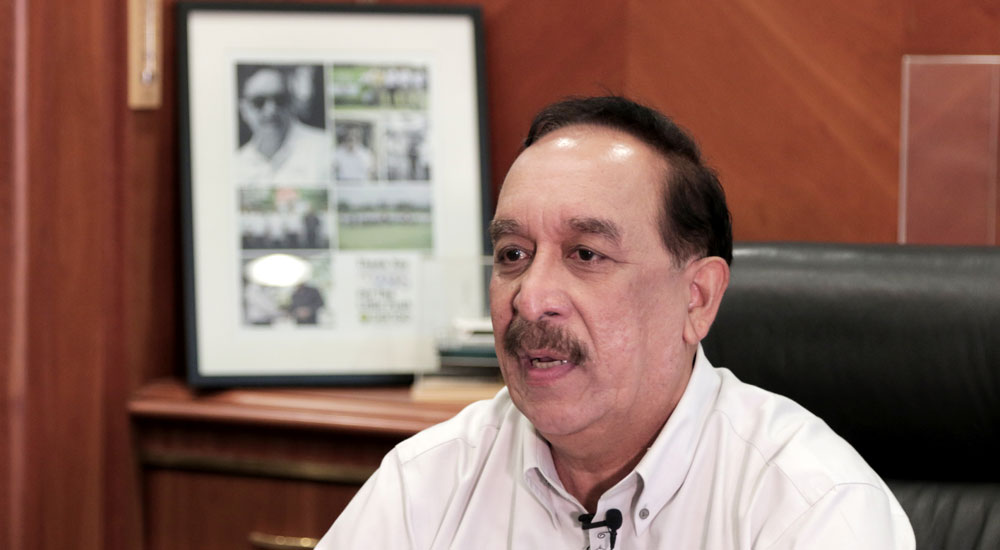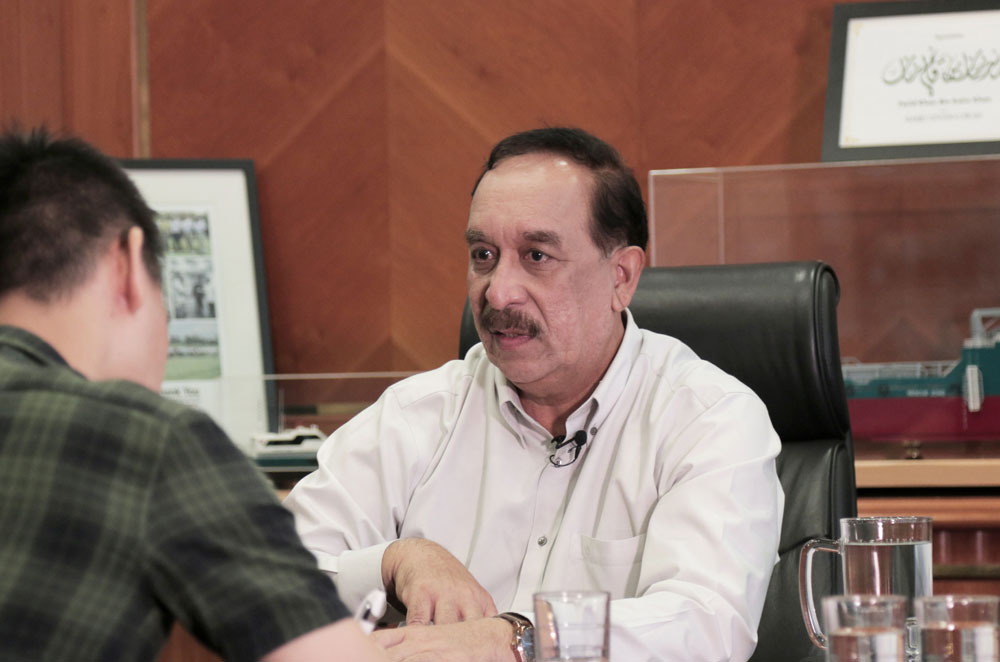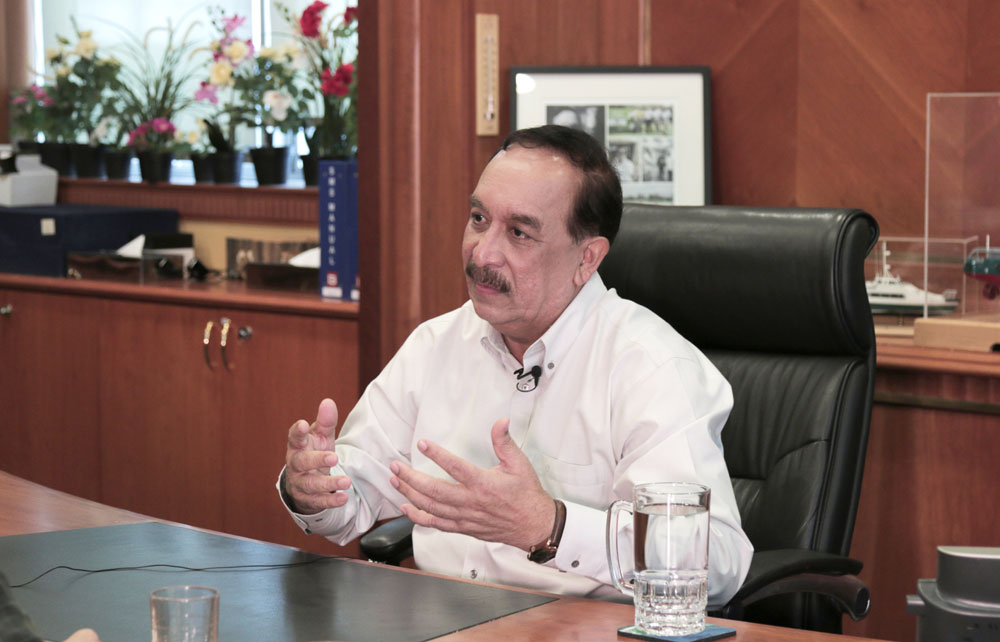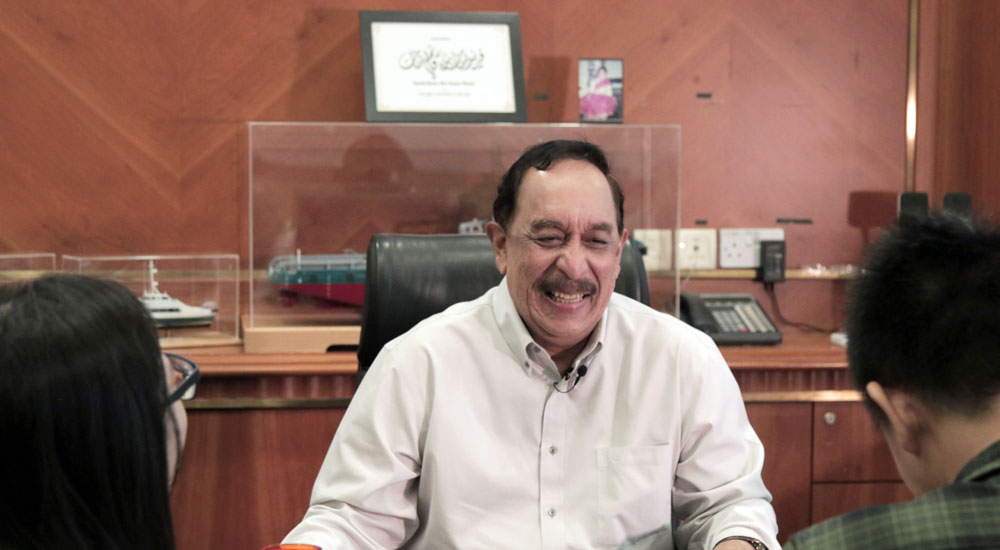How does one interview Farid Khan? On what terms should we interview him?
As he is not even confirmed as a candidate for the upcoming presidential election destined to be held in a month's time -- simply because the rules governing the race and his race are amorphous and convoluted -- must we talk to him like he is really going to be president or just another regular Joe eyeing the highest office of this land?
Interview him as someone at the mercy of The System
For those of you who understand conditional probability, the hurdles for Farid to clear are aplenty and barely surmountable.
Firstly, is he Malay enough because his identity card clearly says "Pakistani"?
And if he is, does he have the chops because the company he heads does not have at least S$500 million in shareholders’ equity?
At the rate things are panning out, and for these issues to be convincingly addressed, it will be nothing short of a sustained miracle that Singapore even pulls off this PE2017 due in September without evoking some amount of incredulity among the electorate.
If there is no walkover, that is.
Farid is one of three potentially potential candidates
To cut to the chase, Farid is simply one of three potentially potential presidential candidates.
Why "potentially potential"? Let's say, even if he qualifies, what are his real odds of winning given how this election has been structured?
Before we get too far ahead of ourselves with speculating, the other two who have made known their desire to be president -- but also have to be granted their Certificates of Eligibility -- are former speaker of parliament an unemployed woman, Halimah Yacob, and Second Chance apparel boss, Salleh Marican.
Farid's value proposition
Farid's value proposition is fairly straightforward though: He is neutral, he is not a political animal or smooth operator, he understands fully the roles of the president of Singapore, he is a burly man of the street, born and moulded by it, he grew up poor, he would sacrifice his life for this country at the drop of a hat, he can reach out to regular folks and talk business at the snap of a finger, he is humble and he loves his family very much. He is also into golf and can play one mean game of table tennis. His fuller name is Farid Khan Kaim Khan and he is the chairman of marine service provider Bourbon Offshore Asia Pacific.
Other details about the 62-year-old have emerged: He has two children, a daughter, 24 and a son, 18. The family of four, who volunteers with the less fortunate, lives in a three-storey bungalow in Kembangan. His son has to do UberEats delivery because he doesn't believe in pampering. Farid is especially big on charity.
Authentic questions

However, to dig deeper and hit him hard with some authentic questions, Mothership.sg interviewed Farid Khan in his Ubi office on Aug. 18, 2017, armed to the teeth with questions regular Singaporeans would want to ask -- because we couldn't be tasked to reasonably carry out our democratic role as a media of sorts when we don't even know what status this man occupies.
Regardless, here are the 20 authentic questions Mothership.sg asked Farid Khan, a potentially potential presidential candidate for PE2017, if it ever happens:
1. What is your approach to this election?
We expected three candidates. My strategy from day one is the same: It is to be completely independent, neutral, not from the establishment. This will be my strength. People can relate to that.
2. When did you seriously consider running?
I followed the last election and then forgot about it. Mr Tan Cheng Bock raised a few issues but I was still not decided if I would contest.
Then the news came that the EP would be reserved for Malays, that kind of got me interested again. More candidates will give the people more choice. And then they said the criteria of S$500 million, and okay, there will be lesser people brave enough to announce they will like to run.
In May 2017, I thought about the pros and cons, what I can contribute. It took me about a week to do the research, what exactly is needed, what Singaporeans want.
I want to be a president that Singaporeans want. You cannot be what you want. It doesn't work like that, especially if you want to be independent and neutral.
After I did the research, I thought, okay, I fit the bill. Why not I try?
Then I thought about my business, my family, my community, how would they react? I talked to my partners and they said I have done enough for the company. I have given the prime of my life from 50 to 62 years old to my company. Then they said I better get approval from my wife. That's the most difficult part.
I approached my children first. (Laughs)
3. What were some issues that were raised about wanting to become president?
Privacy issues. We are very private people. I have never been in the limelight, I have never wanted to be in the limelight. My wife said: 'You've never wanted people to know who you are and here you are exposing yourself to the whole of Singapore, who would start to scrutinise you.'
But like I said, it is a sacrifice, and if it is worth it or not for my country? I am not a politician, no worries about that. When I explained it this way, my wife found no reason to go against it.
Then my wife said, 'Farid, if you go, I will go with you all the way.' Because we've been married for so many years.
4. How does it make you feel that you could be a recipient of anti-PAP or anti-government votes in this presidential election?
I don't want Singaporeans to vote for me because of a protest against anybody. I want Singaporeans to look at what I stand for. This is very important for us because this presidency does bring some kind of controversy with it.
Take the politics out of it, I say. Look at the candidates and what can they do for you. This is more important to me. Look at this person who has sacrificed everything he has, he could have gone into retirement mode and go on holidays every three months, but he is now standing in front of you and declaring that he will be representing you to be elected. This is more important to me than anything else.
5. Then would you still run if this was an open election?
Yes, I would have. I would look at the strategy to see if there are many people fighting for the same cause. If there is, it wouldn't make sense. You also need to look at the other candidates and see what they have to offer. Because this is for the people, not for yourself. You got to be careful about the reasons.
6. Given what you know of your peers in business, how many people do you think are eligible to run in this election, given the terms and conditions and the many rules?
I have done a little study, based on Singapore's businessmen, about 0.2 percent or something like that would qualify. From the Malay community, I do not know, because for those running companies, I do not know what's their equity, but it will be quite a difficult criteria to fulfill.
7. Who did you vote for in the 2011 Presidential Election?
I voted for the best person. (Laughs)
I voted for the person who could best represent the country and the people.
8. What were your considerations when voting for a president in 2011?
I voted for the person who could do what's best for the country when elected. I studied all of them -- who does not think for himself, but more for the country.
If you see what I stand for, you would know who I would vote for when they ran.
9. Let's put it another way then: What do you think are President Tony Tan's best qualities?
I would try not to comment about other people, it's such a tricky question. (Laughs) You guys are good.
Okay, let's look in general. All the presidents we had. All have their strengths and weaknesses. Look at Ong Teng Cheong. From the establishment, a good guy, tried his best when he crossed over to serve the country, I like what he has done and what he stands for. The rest of public figures, non-controversial, you know.
SR Nathan did quite a lot of good things, like the President Challenge. He fundraised quite a lot of money for charity. He was watching the reserves, but unfortunately, during his presidency, that was when the crisis occurred and he was asked to dig into the reserves. He made some good decisions.
I would like to go further to raise more money for charities, for the aged, youth-at-risk, family bonding.
President Tony Tan is like a fatherly figure, but perhaps not as much visibility.

10. Would you run in six years time if you don't win this time, assuming there is an election this time?
I have made my decision. If I don't win or if I don't qualify, I will go on my retirement mode. I promised my wife. She will not allow me to run again.
11. Halimah Yacob has a global narrative. She is a woman, she wears a headdress, she is breaking glass ceilings and she stands in such stark contrast to Donald Trump. What is your global narrative then?
I have regional experience. I work in a multinational company with a head office in France. I travel quite a lot, to the Middle East. I travel around the whole of Asia. In the Bourbon group, there are 89 nationalities. This is where I learnt quite a lot. I kind of understand the sentiments of people from all over the world.
If I am elected, I am different from Donald Trump. He was elected to run the country, I'll be elected to represent the people, to look after the reserves and look after the appointment of top civil servants.
I understand fully the three functions of the presidency: Discretionary, non-discretionary and unifying ceremonial role. That is where my focus is. I can meet any leaders and sit down to talk to them. If they want to talk about golf, I can. If they want to talk over durian. I can, even if I don't like durian.
11. If the public perception is that you are just a businessman, how would that make you feel?
Don't just look at me on the business side. Look at the person himself. What kind of person I am?
Look into this man. Judge him by his heart, not his head. This is important for me. Why is he doing this? Who is Farid Khan? Not just the chairman of Bourbon.
12. How should people understand you then? What issues do you champion and what do you stand for?
I am a patriotic guy. Three challenges I faced when I decided to run. The first is with myself. I had to decide whether I wanted to come out to run, and I did.
The next challenge will be to submit my documents and get approval to run.
The third challenge is in the hands of the people. If people go to vote, why would they vote for me? I would like to be that person the people vote for.
I am very close to the ground. I know the issues. I can see both sides of the issue. I can understand the public sentiment and relate to the ground. After talking to people on the ground, I can put on a tie and talk to high-level people.
I am not eloquent but I can talk to people.
13. Is there one thing you promise you would do if elected?
I will listen to the people but my hands are tied. That's written in the constitution. There are things I can do and things I cannot do.
I will go to the ground and speak to the people. Tell me how I can help you. There is a unifying ceremonial role of the president and I will do it. I will offer to help you and I will not wait for you to approach me. I will use the position fully to show support.
14. So you have been helping youths at risk? For how long?
About four years. I will speak to them, 'Look at me, I am a dropout. Nobody even took a second look at me. I didn't even pass Secondary One. But do not be discouraged. Show your enthusiasm and be sincere. I don't have the qualifications.'
But I will show them that they can do it

15. Do you think Singaporeans vote along racial lines?
Do not look at what race I am. Look at me as a true blue Singaporean. Would I die for Singapore? Yes. I will. Look at the sincerity of this guy. Look at the things I have done. Look at what I have done. Go beyond racial lines. Be proud of using your vote to put this person into office.
16. What are your thoughts if the absenteeism rate is high this Presidential Election, because that is how some Singaporeans show their protest?
Do not spoil your votes. I am urging Singaporeans to not spoil their votes. Your vote can put this person into office. Choose the person you feel can best represent you. It is your right. Don't throw away your right. What you do now will affect the next election. Choose wisely. Show the rest of the world.
17. Have you encountered racism in your life?
Yes, of course, I have experienced it. Like when you are in the airport, they will target you. But in Singapore, I am very lucky. I have never had people say anything bad about me on the street. I am very fortunate. I am so glad I am born in this country.
18. What would you do in your position as president to help Singaporeans who feel they can identify with problems related to their race?
We need to educate that we are Singaporeans first and foremost, we love this country that's why we are still here. I am quite happy the younger generation of Singaporeans are quite open to one another and they talk to one another quite freely.
I have heard of minorities applying to the private sector jobs and they do not get it. But keep trying. Build the bridge. Do not be discouraged.
As a president, I represent all Singaporeans. I don't represent Malays or Pakistani only. Rather than talk about the past, we need to move forward.
19. Are there any specific things you will do to address issues of race and racism?
In the maritime industry, where I spent my life in, be it Malay, Indian, Chinese, if the ship goes down, you go down regardless of your race. If there are issues, address it.
I will urge all communities to build this bridge. We have issues, but we can manage. Work on engagement and be an inclusive society. Come forward and meet, stretch out your hand.
Remember Nelson Mandela? He came out of prison and rugby was used to bring people together. There are many ways to do it. I will find the right organisations. Go to the ground.
Regardless, of who you are, if you are Singaporean, and something happens to Singapore, you will be affected. Together we build this nation. We must stay together and Singaporeans can rally around Singaporeans. When under pressure, we will rally to stay together.
20. Do you feel the Singapore government has done a good job running this country?
They have done quite well. We have to be fair. We have to give credit where credit is due. They have done quite well. On the security and economy side. When the time comes, Singaporeans have to vote, and when they have to choose, they still vote for the party that can do the job.
If you like what you read, follow us on Facebook, Instagram, Twitter and Telegram to get the latest updates.

